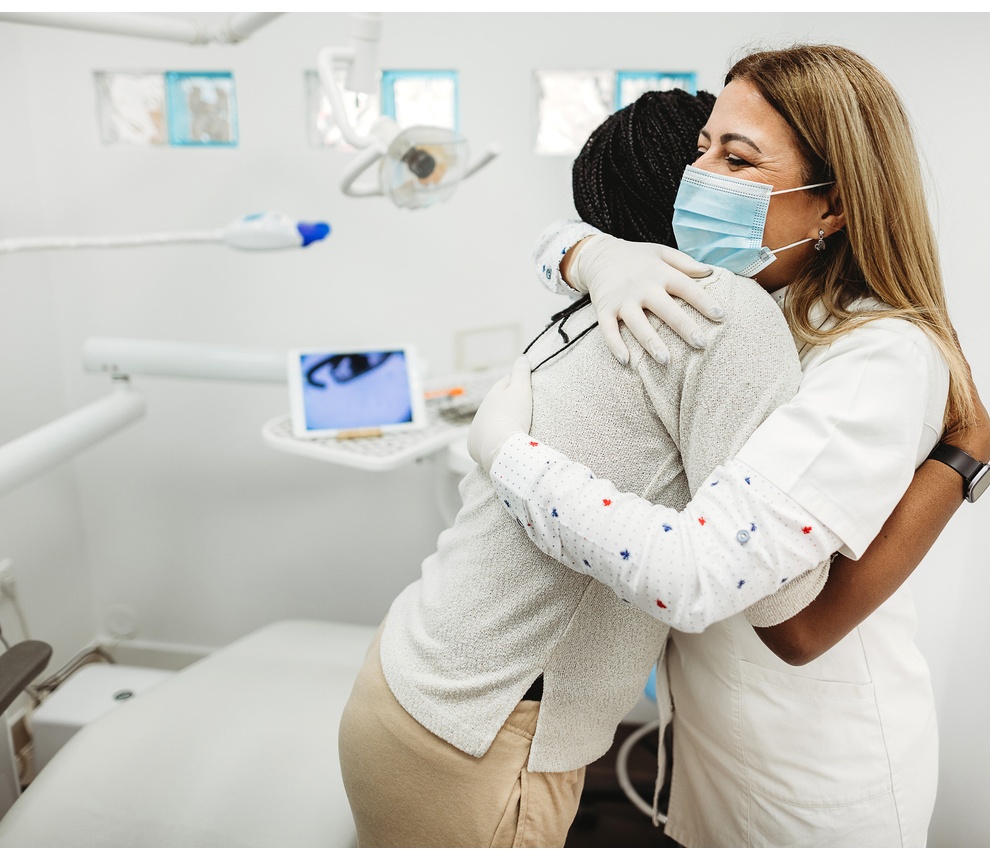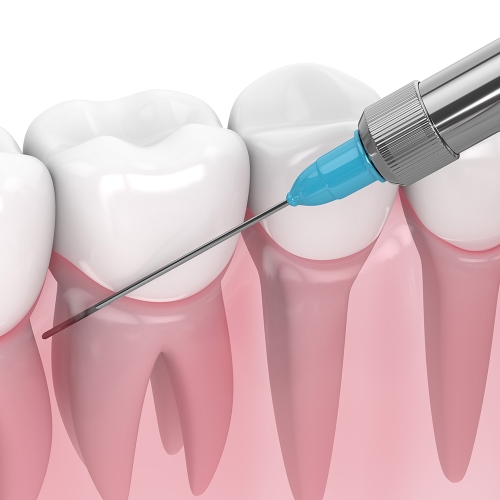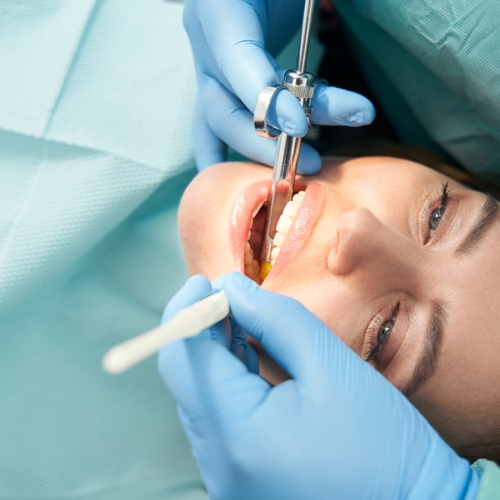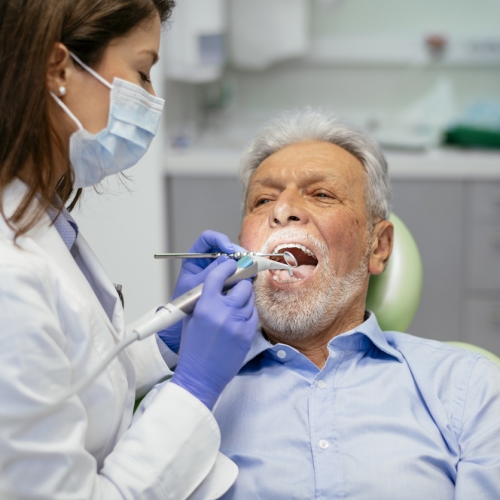Benefits of Good Communication
Using effective verbal and non-verbal communication can improve patient satisfaction and health outcomes. Mutual understanding between a dentist and a patient can help provide the best possible care to meet that patient’s specific needs. Perhaps more importantly, clear communication allows patients to become informed participants in their care.
Research has found that good communication improves patients’ experiences with dental care.1 Specifically, people who receive well-communicated health education from their dental providers have a better self-reported health status and increased satisfaction with the outcomes of their dental care. Other research has shown that patient trust in dental providers plays a significant role in oral health-related quality of life.2
Research shows that the quality of communication affects patients’ trust, satisfaction, and anxiety levels.3 In this study, patients who experienced previous positive communication with their dental providers had better oral health literacy, higher satisfaction with their care, and less mistrust. Meanwhile, patients who had a negative experience communicating with their dentist had more anxiety and dental mistrust.
Keys to Good Communication
Good communication between dentist and patient requires the participation of both parties. Using good interpersonal skills should facilitate an ongoing conversation between dentist and patient that allows both dentist and patient to have a voice and be heard.
- Be compassionate
The starting point for building trust through communication is demonstrating respect and empathy. Being warm, polite, encouraging, and non-judgemental are all important to help patients feel at ease and respected.4 Patients want a confident, compassionate, empathetic, and respectful dentist.5 Greeting patients, making eye contact, and carefully listening to patient concerns are part of effective communication. Additionally, respecting cultural values and individual preferences can help build a patient’s trust. Remember, good communication requires both speaking and listening on the part of the patient and dentist alike.
- Make things clear
Spend time with patients to ensure that you have the opportunity to have conversations about their care. This allows for two-way communication and the chance to ensure that both you and your patient understand each other. Using precise—but not technical—language can prevent misunderstandings. Additionally, be aware of language barriers. Allowing patients to express themselves in a language they are proficient it can prevent misunderstandings.6 Providing information in a format that is understandable to the patient is necessary for informed consent.6

- Keep it concise
Long-winded and overly technical conversations do not benefit the patient. Concise questions, answers, and explanations must be focused on a clear message that you want to deliver to the patient.5
- Be thorough
Take every opportunity to ask your patients if they understand you or have any concerns or questions. Asking questions allows patients to speak their minds and ask questions of their own.5
- Follow up
Give patients an opportunity to rate their dental visits. You can use surveys or questionnaires such as the Dentist Trust Scale to solicit patient reviews of their experience and your performance, including communication skills.5,7 This creates an opportunity to improve future interactions.

How To Build Trust
Clear communication can build trust, but how information is communicated can be just as important as the information itself. Empathy and kindness can improve communication and help build trust, as can managing expectations and ensuring that patients have a say in their care. Ultimately, building a healthy relationship with patients has the potential to improve the quality of care.
- Be empathetic
Empathy is fundamental to building trust with patients.5,8 The simple act of imagining what another individual is experiencing can offer a new perspective on how to best care for an individual. Another aspect of empathy is emotional intelligence; understanding a patient’s emotional state and behavior can better guide the ongoing conversation.
- Set clear expectations
A disparity between expectations and reality harms any relationship. Asking patients about their expectations before treatment gives you a starting point to shape how they perceive their care.5 Explaining and demonstrating procedures and educating patients about their oral health can ease anxiety and uncertainty.
- Ensure patient engagement
Patients should be involved in making decisions about their care.5 Presenting them with options is important, but they must first be educated about those choices and the potential consequences. Clear communication allows for informed decision-making.
- Build relationships
Establishing a rapport with patients involves building relationships. Proper dental care requires repeated dental visits for routine cleanings and dental procedures, so making patients feel safe, comfortable, and well cared for is an important part of maintaining continuity of care.5 Patients and dentists must work together as partners to achieve the best outcomes.
- Use teamwork
Building relationships with patients should involve the entire treatment staff. Patients should feel like they have as important a role in their dental care as the dentists, hygienists, and techs that they deal with.5

Good Communication Fosters Trust
Building trust requires effective two-way communication between dentists and patients. Trust is important in the dentist–patient relationship because it affects patient satisfaction as well as health outcomes. Putting in the time and effort to have productive patient interactions based on trust ultimately results in a better quality of life for patients.
RESOURCES
- Chiou SJ, Lee LH, Lee PC, Lin KC. Better self-report health status and provider-patient communication in dental service can improve the patient experience: A cross-year comparison from the NHI Survey. Health Commun. 2020 Nov;35(13):1569-1575. doi: 10.1080/10410236.2019.1652390. Epub 2019 Aug 19. PMID: 31423836
- Muirhead VE, Marcenes W, Wright D. Do health provider-patient relationships matter? Exploring dentist-patient relationships and oral health-related quality of life in older people. Age Ageing. 2014 May;43(3):399-405. doi: 10.1093/ageing/aft183. Epub 2013 Nov 25. PMID: 24275429
- Fico AE, Lagoe C. Patients' perspectives of oral healthcare providers' communication: Considering the impact of message source and content. Health Commun. 2018 Aug;33(8):1035-1044. doi: 10.1080/10410236.2017.1331188. Epub 2017 Jun 16. PMID: 28622005
- Yamalik N. Dentist-patient relationship and quality care 3. Communication. Int Dent J. 2005 Aug;55(4):254-256. doi: 10.1111/j.1875-595x.2005.tb00324.x. PMID: 16167615
- Nova Scotia Dental Association. Patient Communications: A Guide for Dentists. Accessed March 10, 2023. https://www.cda-adc.ca/_files/practice/practice_management/patient_communications/guides/dentalguide-ns.pdf
- Goldsmith C, Slack-Smith L, Davies G. Dentist-patient communication in the multilingual dental setting. Aust Dent J. 2005 Dec;50(4):235-241. doi: 10.1111/j.1834-7819.2005.tb00366.x. PMID: 17016888
- Armfield JM, Ketting M, Chrisopoulos S, Baker SR. Do people trust dentists? Development of the Dentist Trust Scale. Aust Dent J. 2017 Sep;62(3):355-362. doi: 10.1111/adj.12514. Epub 2017 Jun 7. PMID: 28346696
- Orsini CA, Jerez OM. Establishing a good dentist-patient relationship: Skills defined from the dental faculty perspective. J Dent Educ. 2014 Oct;78(10):1405-1415. PMID: 25281674




































